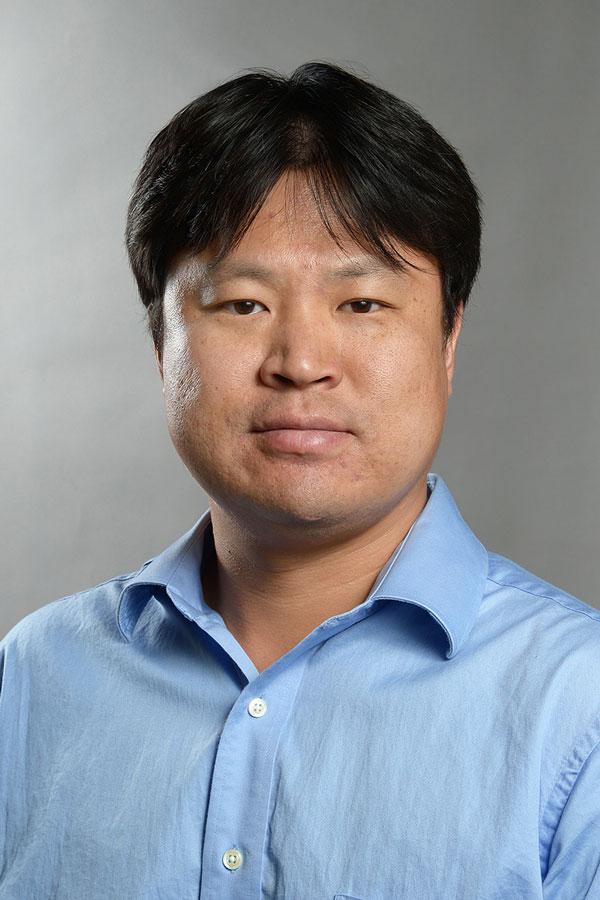Get started with Mizzou
Apply hereMaster of Health Administration
Change defines the direction of the always-dynamic health care industry. This isn’t a think-tank observation: as a clinical, information or financial professional, you have an insider’s perspective of recent developments and how they correlate with care quality and delivery. Day to day, you not only serve patients along the lifespan but also recommend newly launched therapies and treatments, utilize recordkeeping software and draw from current research to improve outcomes. And as advancement unfolds around you, you also notice both a gradual shift in patient demographics and the interconnectedness between lifestyle and population health trends.
Why just take things as they come? Build upon your background to foster broad transformation with Mizzou Online's executive master of health administration (MHA) program. Geared toward health care professionals with a minimum of three years of experience, the program’s online and in-person courses delve into the relationship between clinical and managerial knowledge and how these areas work together to empower patients and communities. In the process, you’ll understand how integral effective leadership is within health care organizations, from making decisions based on data and financial considerations to introducing policies that support clinical professionals and enhance care access.
About the online MHA program
Every organization needs visionary, driven leaders equipped to analyze existing processes, propose new measures and help all employees achieve optimal outcomes. Health care is no different.
Yet, managing teams, facilities and hospital systems is just as complex as the industry itself. Health care administrative careers stand upon a traditional foundation of finance, interpersonal communication, strategy and organizational leadership. From here, however, your actions are amplified. Any decision you make has a rippling effect across neighboring communities and your industry partners. At the same time, the technologies you implement may potentially streamline your workplace, but they also must comply with HIPAA.
Mizzou’s blended MHA program expands upon all you’ve acquired as a clinical, administrative or information professional in the health care industry. Through courses exploring the field’s legal, administrative, policy and financial sides, you’ll grow into a discerning, fiscally responsible leader committed to change, innovation and improving health services delivery at patient and population levels.
To encourage these outcomes, the Department bases the MHA curriculum around a modified version of the National Center for Healthcare Leadership’s competency model for health sector leaders. These standards emphasize:
- A comprehensive understanding of health organizational processes and their applications to achieve results.
- Evidence-based decision-making to promote positive population health outcomes.
- Collaboration between clinical and administrative professionals to structure impactful outreach initiatives and provide quality care.
- Building a culture of quality and continuous improvement rooted in change, education, research and health services delivery.
- Selecting technologies to assess and boost your organization’s performance.
Further reflecting program quality, Mizzou is a member of the Association of University Programs in Health Administration (AUPHA). This global network of colleges strives to elevate health outcomes and foster innovation through health care management and policy education.
Quick facts
Official name
Master of Health AdministrationCampus
Program type
Master's degreeDelivery mode
Blended, some campus visits requiredAccreditation
Higher Learning Commission, CAHME (Commission on the Accreditation of Health Management Education)Credit hours
42Estimated cost
$52,374.00*This cost is for illustrative purposes only. Your hours and costs will differ, depending on your transfer hours, your course choices and your academic progress. See more about tuition and financial aid.

Career prospects
Don’t just experience change — develop and drive it within your organization with Mizzou’s Commission on Accreditation of Healthcare Management Education (CAHME)-accredited program.
Now’s the time to harness your aspirations: the Bureau of Labor Statistics predicts 28% more positions for health and medical services managers through 2032. Whether you aim to stay within your organization or branch out to an adjacent field like insurance or the nonprofit sector, the MHA program gives you the leverage and real-world context to access such roles as:
- CEO
- CFO
- Continuous improvement manager
- Director of health information management
- Director, supply chain operations
- Manager, care coordination
Program structure
Designed to cultivate professionals ready to tackle issues currently facing health care organizations, the executive MHA program requires 42 credit hours divided between 12 core courses and an independent research project. The following structure connects fundamental management concepts to health care-specific applications:
Prerequisites: All students must complete courses in statistical analysis, microeconomics, managerial finance and accounting before starting the core sequence.
Blended format: Students take courses primarily via distance learning and meet periodically for required weekend on-site sessions. Dates are announced ahead of time.
Two years to completion: The typical executive MHA student takes three courses per semester to finish the program in four consecutive semesters, including summer sessions.
Collaborative cohorts: A cohort model facilitates interaction and knowledge sharing between faculty and students, all of whom bring unique, specialized perspectives of the health care field. This format keeps the curriculum up to date and additionally allows students to strengthen their professional networks and start to position themselves as experts.
Coursework includes
Deepen your understanding of health care management and leadership through courses covering:
- The U.S. health care system, including its administration and structure
- Applications of health informatics and artificial intelligence
- Finance, accounting, human resources and economics for the health care field
- Evidence-based problem-solving, decision-making and strategic planning
- Epidemiology in health services management
- Health care law and policy
Review all requirements for the executive master of health administration program.
Delivery
Blended, some campus visits requiredCalendar system
Semester-basedTypical program length
2 yearsRelated graduate certificate programs
You can earn a 12-credit graduate certificate in related programs:
See all online programs offered through the College of Health Sciences.
Accreditation
This program is accredited by the Higher Learning Commission, one of six regional institutional accreditors in the United States, and CAHME (Commission on the Accreditation of Health Management Education).
Faculty spotlight

Sue Boren is the program director and an alum of the master of health administration program. Dr. Boren’s research focuses on consumer health informatics, health informatics and health administration education. She investigates how informatics can improve patient and student learning outcomes and has co-authored over 80 articles on decision-support technologies, telemedicine, e-health, chronic illness management and education. Dr. Boren has a strong history of service, directing the Commission on Accreditation of Healthcare Management-accredited programs, leading accreditation efforts and serving on various committees and boards in the health informatics field. She teaches health informatics for leaders and methods of health services research in the program.

David Moxley has been a member of the University of Missouri faculty since 1998. He serves as associate director of the master of health administration (MHA) program. He teaches the methods of health services research class in the program and serves as a faculty advisor for most MHA students. He has expertise in information retrieval, learning technologies and controlled vocabularies. He has received several honors for his work, including being a past Fellow of the Interdisciplinary Center on Aging and a member of the Association of University Programs in Health Administration and the Academy for Healthcare Improvement.

Patricia Alafaireet finds solutions that enable health providers to work more effectively. Dr. Alafaireet investigates how health providers can most effectively use information technology and data to enhance their practice. Her research interests include graphical user interface aesthetics for physician use, recidivism in mental health delivery and the application of informatics tools to day-to-day health delivery operations. Dr. Alafaireet’s latest publications focus on the development of human-centered service design and the use of technology to improve health outcomes. She is also involved in the evaluation of teen parenthood and cardio-vascular disease prevention programs and consults for programs that address hunger, substance abuse and vaccine hesitancy.

Brian Hensel has extensive experience as a healthcare administrator, including responsibility for various care services within hospital-based health systems. Dr. Hensel has a doctorate focused on health communication and is a postdoctoral Fellow in health informatics. Additionally, he served as a Congressional Fellow, supporting Senator Rockefeller’s efforts related to the Affordable Care Act and helped develop hospice, palliative care and advanced care planning legislation. Dr. Hensel previously taught at the University of South Dakota. He teaches courses on the U.S. health system, health policy and strategy and marketing.

Min Soon Kim earned his doctorate in biomedical engineering at the University of Texas at Austin and has a background in biomedical informatics. Dr. Kim’s research focuses on developing and evaluating health information technology, including electronic health records systems, clinical decision support systems and mHealth applications. His current funded study involves a mobile application for personalized education aimed at senior diabetes patients. He also has expertise in healthcare informatics and has conducted usability evaluations of electronic health records and clinical decision support systems. Dr. Kim previously worked at the Center for Biomedical Informatics at Mount Sinai School of Medicine and researched utilizing computers for evidence-based medical decisions in breast cancer treatment. In addition to his research, he is an educator, teaching graduate-level classes on an intro to the U.S. healthcare system, fundamentals in health informatics and designing systems for health and human services.
